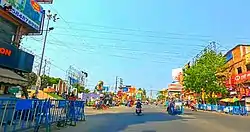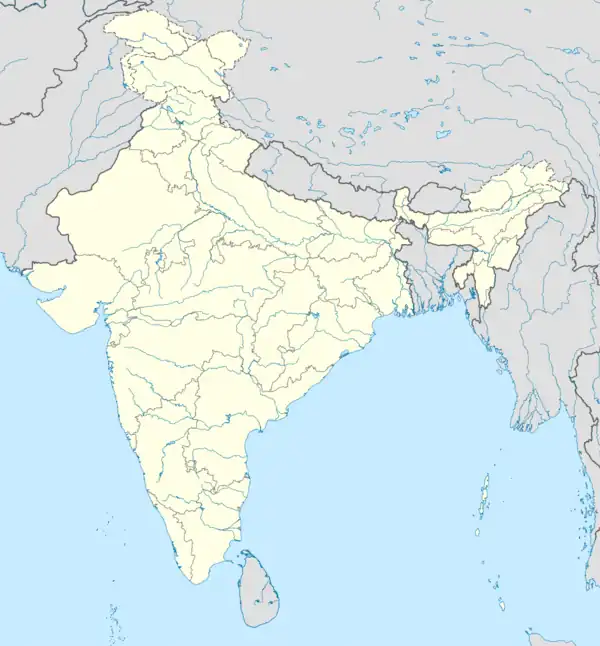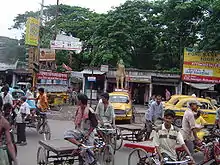Madhyamgram
Madhyamgram is a town and a municipality of North 24 Parganas district in the Indian state of West Bengal.[2] It is close to Kolkata.[5]
Madhyamgram | |
|---|---|
Town | |
 Madhyamgram Chowmatha on Jessore Road | |
 Madhyamgram Location in West Bengal, India  Madhyamgram Madhyamgram (India) | |
| Coordinates: 22.70°N 88.45°E | |
| Country | |
| State | West Bengal |
| District | North 24 Parganas |
| Region | North 24 Parganas |
| Government | |
| • Type | Municipality |
| • Body | Madhyamgram Municipality |
| • Chairman | Nemai Ghosh[1] |
| Elevation | 15 m (49 ft) |
| Population (2020)[2] | |
| • Total | 370,488 |
| Languages | |
| • Official | Bengali[3][4] |
| • Additional official | English[3] |
| Time zone | UTC+5:30 (IST) |
| PIN | 700127, 700128, 700129, 700130, 700133, 700155 |
| Telephone code | +91 33 |
| Vehicle registration | WB |
| Lok Sabha constituency | Barasat |
| Vidhan Sabha constituency | Madhyamgram |
History
Madhyamgram was one of the twelve feudal provinces of Bengal. It was under Pratapaditya Roy, ruler of Jessore during the Mughal Empire.
On 21 December 1757 Mir Jafar, the Nawab of Bengal, presented twenty-four parganas to the East India Company as dowry which also included Madhyamgram, under Anwarpur Pargana, adjacent to Barasat.
The first railway line from Madhyamgram to Duttapukur was commissioned in 1882 and the station was called Chandipur. Madhyamgram was then named as Majher Gaon, probably because the area was situated between Badu (Chakradharpur Mouza) and Sajirhat (Guchuria Mouza).
The present narrow Noai Canal, now acting as a dividing border line between New Barrackpore and Madhyamgram, stretching from the South of Ganganagar to Sajirhat in the West used to be a wide river, once called Labanyabati, which through colloquial transformation became the Noai River, and after years of silt depositions, turned into Noai Canal.
At that time, Anwarpur Pargana was notable for its tobacco trade and a special sweet-smelling blended tobacco was manufactured in Madhyamgram.
Madhyamgram was also a big paddy growing area, and the Labanya River was a medium of navigation for the exportation of those products. Madhyamgram was also notable for its fine embroidery works that attracted appreciation from Delhi and Mumbai. Many Muslim families maintained a livelihood through those works.
Geography
M: municipal town, CT: census town, R: rural/ urban centre, H: historical centre
Owing to space constraints in the small map, the actual locations in a larger map may vary slightly
Location
Madhyamgram is bounded by Barasat II in the east; Barasat II, Rajarhat (community development block), Bidhannagar Municipal Corporation and North Dum Dum in the south; New Barrackpore and Barrackpore II in the west and Barasat in the north.
Area overview
The area covered in the map alongside is largely a part of the north Bidyadhari Plain. located in the lower Ganges Delta.[6] The country is flat. It is a little raised above flood level and the highest ground borders the river channels.[7]54.67% of the people of the densely populated area lives in the urban areas and 45.33% lives in the rural areas.[8]
Note: The map alongside presents some of the notable locations in the subdivision. All places marked in the map are linked in the larger full screen map.

Climate
The climate is tropical, like the rest of the Gangetic West Bengal. The hallmark season is the Monsoon—which occurs from early June to mid September. The weather remains dry during the winter (mid-November to mid-February) and humid during summer.
Temperature: 41 °C in May (max) and 8.3 °C in January (min).

Demographics
Population
According to the 2011 Census of India, Madhyamgram had a total population of 196,127, of which 98,864 were males and 97,263 were females. Population in the age range 0 to 6 years was 16,351. The total number of literate persons in Madhyamgram was 161,087. The effective literacy (7+) of population over 6 years of age was 89.60%. The Scheduled Castes and Scheduled Tribes population was 24,822 and 2,842 respectively. Madhyamgram had a total of 48942 households as of 2011.[2]
As of the 2001 Indian census,[9] Madhyamgram had a population of 198,964. Males constitute 51% of the population and females 49%. Madhyamgram has an average literacy rate of 76%, higher than the national average of 59.5%: male literacy is 80% and female literacy is 71%. In Madhyamgram, 10% of the population is under 6 years of age.

Kolkata Urban Agglomeration
The following Municipalities and Census Town in Barasat Sadar subdivision were part of Kolkata Urban Agglomeration in the 2011 census: Barasat (M), Madhyamgram (M), Rajarhat-Gopalpur (M) (merged with Bidhannagar Municipal Corporation in 2015) and Raigachhi (CT).[10]

Administration
Police station
Madhyamgram police station serves a population of 198,964. It has jurisdiction over Madhyamgram Municipal area and Barasat II CD Block.[11]
Economy

There is a major textile mill and a rubber factory in this area. Star Mall is located in Madhyamgram on Jessore Road. The mall was launched in 2008 and has a gross leasable area of 237,000 sqft.[12][13]
Transport
Madhyamgram is characterised by its close proximity to an airport (Kolkata Airport) (around 15 minutes). Madhyamgram is a four-point junction of Jessore Road (part of State Highway 12), Sodepur-Barasat Road and Badu Road.[14] East and west parts of Madhyamgram are connected with a Rail Overbridge (Madhyamgram Bridge), which was opened in 2006.[15]
Many private and governmental public buses serve the town. Taxi services are one of the most popular forms of transportion to reach nearby towns like Sodepur, New Barrackpore and Barasat. Rickshaws, three-wheeled pedalled vans and battery-operated e-rickshaws ("toto" vans) are also used for short distances.
Madhyamgram railway station on the Sealdah–Hasnabad–Bangaon–Ranaghat line serves the town.
Education
Vivekananda College is a degree college in Madhyamgram. The engineering college Camellia Institute of Technology and the management college Camellia School Of Business Management are also located here.
Sports
Madhyamgram High School has won the Subroto Cup, an all-India inter-school soccer competition, seven times, which includes a hat-trick (in the years 1981, 1982 and 1983).[16]
References
- Official District Administration site Archived 15 January 2007 at the Wayback Machine
- "Census of India: Madhyamgram". www.censusindia.gov.in. Retrieved 16 October 2019.
- "Fact and Figures". Wb.gov.in. Retrieved 16 October 2019.
- "52nd Report of the Commissioner for Linguistic Minorities in India" (PDF). Nclm.nic.in. Ministry of Minority Affairs. p. 85. Archived from the original (PDF) on 25 May 2017. Retrieved 16 October 2019.
- District-wise list of statutory towns, Archived 19 March 2005 at the Wayback Machine
- "District Census Handbook North Twenty Four Parganas, Census of India 2011, Series 20, Part XII A" (PDF). Page 13. Directorate of Census Operations, West Bengal. Retrieved 16 April 2018.
- LSS O’Malley (2009). Bengal District Gazetteers: 24 Parganas. ISBN 9788172681937. Retrieved 3 May 2018.
{{cite book}}:|work=ignored (help) - "District Statistical Handbook". North 24 Parganas 2013, Tables 2.1, 2.2, 2.4b. Department of Statistics and Programme Implementation, Government of West Bengal. Archived from the original on 21 January 2019. Retrieved 2 May 2018.
- "Census of India 2001: Data from the 2001 Census, including cities, villages and towns (Provisional)". Census Commission of India. Archived from the original on 16 June 2004. Retrieved 1 November 2008.
- "Provisional Population Totals, Census of India 2011" (PDF). Constituents of Urban Agglomeration Having Population Above 1 Lakh. Census of India 2011. Retrieved 30 May 2018.
- "North 24 Parganas Dist. Police". Know Your Police Station. District Police. Retrieved 4 June 2018.
- "Mall sprawl in deep north". The Telegraph. 4 October 2006. Retrieved 26 November 2020.
- "Star Mall Information". Retrieved 26 November 2020.
- Google maps
- "Madhyamgram Bridge".
- Marmar Mukhopadhyay (21 July 2005). Total Quality Management in Education. SAGE Publications. p. 157. ISBN 978-0-7619-3368-7.
External links
 Kolkata/Northern fringes travel guide from Wikivoyage
Kolkata/Northern fringes travel guide from Wikivoyage
